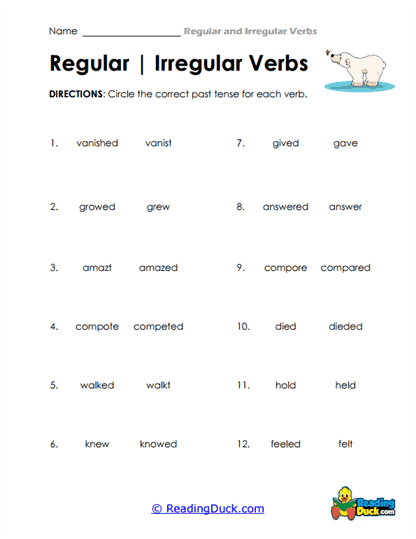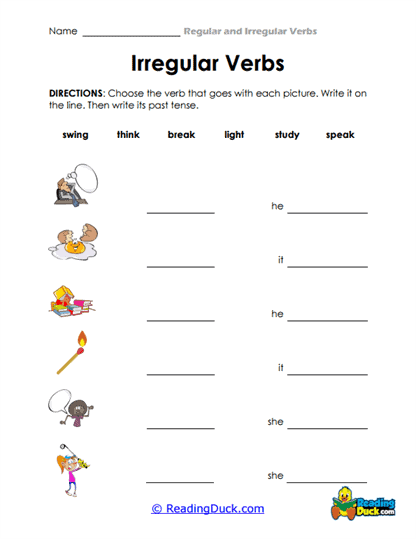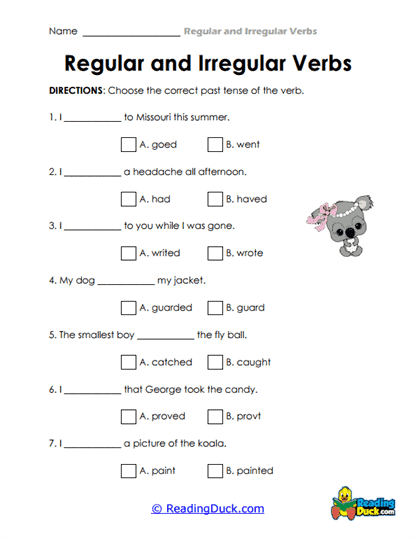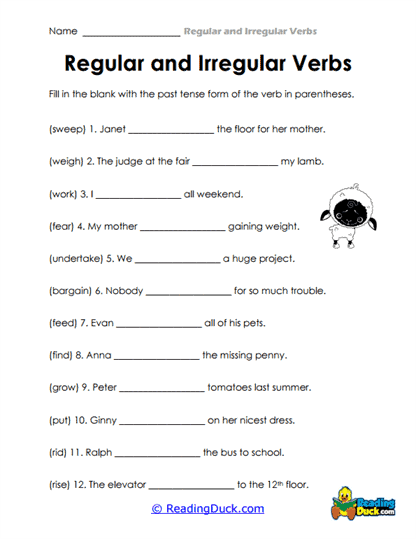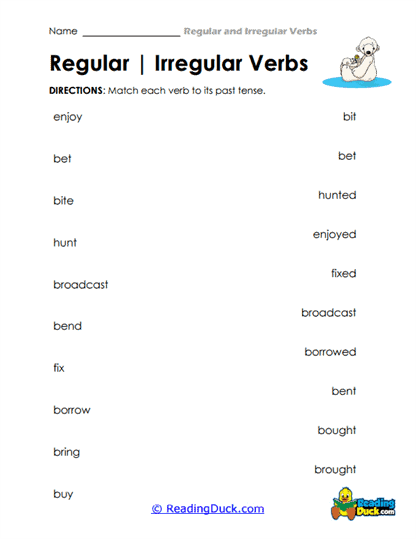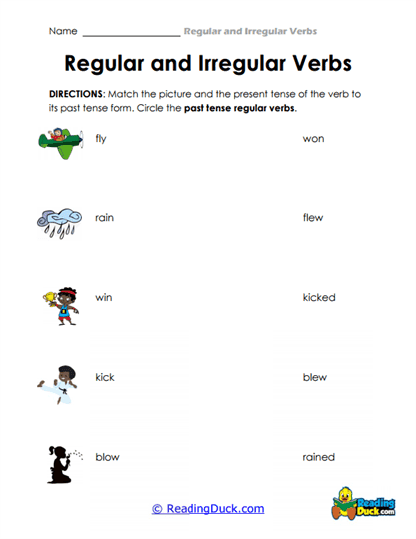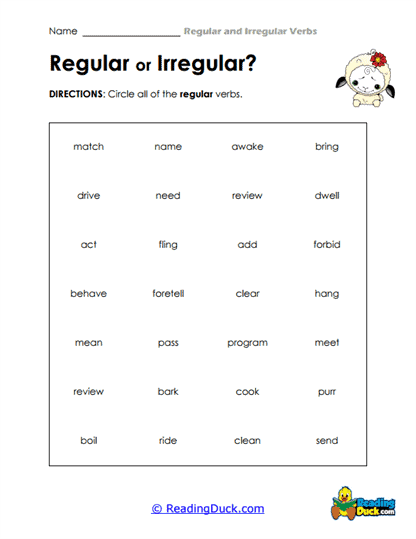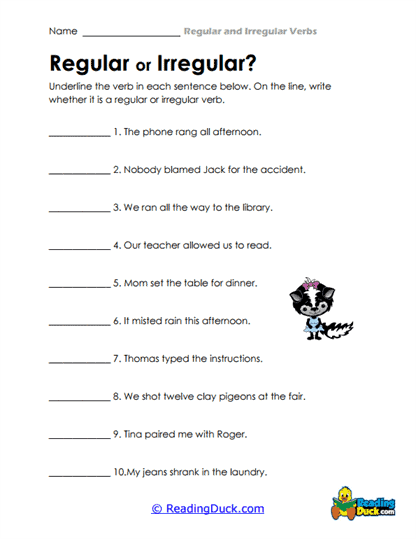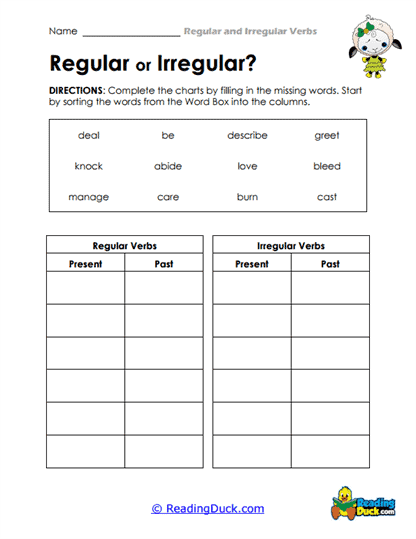Regular and Irregular Verbs Worksheets
About Our Regular and Irregular Verb Worksheets
Our Regular and Irregular Verbs Worksheets are expertly designed to help students master one of the fundamental aspects of grammar: verb conjugation. These worksheets guide students through the process of distinguishing between regular and irregular verbs, teaching them how to conjugate and use these verbs accurately across different contexts. Understanding how to properly use both regular and irregular verbs is essential for students as they develop strong communication skills in both writing and speaking.
With these worksheets, students will practice identifying patterns in regular verbs, which follow predictable rules, and memorizing irregular verb forms, which deviate from standard conjugation patterns. The ability to recognize and correctly conjugate these verbs is key to effective and fluent communication. The worksheets are available in downloadable PDF format, ensuring that they are easy to view, print, and use in various educational settings, from classrooms to independent study at home. Each worksheet also includes a downloadable answer key, providing a convenient way for students to assess their progress and for educators to offer guided feedback.
The Role of Regular and Irregular Verbs in Language Development
Regular and irregular verbs form the backbone of language development, playing a crucial role in sentence structure and the clear expression of time and actions.
Regular Verbs: These verbs follow a consistent and predictable pattern when changing tenses. Typically, the past tense of regular verbs is formed by adding “-ed” to the base form. For example:
- Walk → Walked
- Cook → Cooked
Regular verbs offer a straightforward framework for students learning to express actions that have occurred in the past. By understanding this pattern, students can quickly and accurately form sentences that are grammatically correct.
Irregular Verbs: In contrast, irregular verbs do not follow standard conjugation rules. Their past tense forms must be memorized, as they vary widely. For example:
- Go → Went
- Buy → Bought
Because irregular verbs do not conform to a predictable pattern, they require more focused study and practice. Despite their complexity, mastering these verbs is essential for students to effectively communicate in both everyday conversations and academic writing.
A strong grasp of regular and irregular verbs allows students to express time and action with clarity. Whether describing past events, current actions, or future intentions, proper verb conjugation ensures that students can communicate their thoughts accurately, making their language more dynamic and precise.
Strategies for Introducing Regular and Irregular Verbs
Introducing regular and irregular verbs in the classroom can be made more engaging with thoughtful strategies that help students differentiate between these two types of verbs. By presenting the topic in a way that builds on prior knowledge, educators can make the learning process both fun and effective.
Start with Familiar Verbs: Begin by using verbs that students are likely already familiar with, as this helps ease the transition into learning verb conjugation. Examples might include commonly used verbs like:
- Play (regular) → Played
- Run (irregular) → Ran
- Eat (irregular) → Ate
Familiarity helps students more easily grasp the concept of regular versus irregular verbs, building confidence as they begin to explore more complex verb forms.
Use Verb Charts: Displaying verb charts that list both regular and irregular verbs side by side is a highly effective way to visually demonstrate the contrast between the two. These charts can help students quickly identify how regular verbs follow patterns, while irregular verbs require memorization due to their varying forms.
Practice with Real-Life Scenarios: Engage students with everyday scenarios to help them identify verb types in practical settings. For example, you might create sentences based on daily activities and have students determine whether the verbs used are regular or irregular.
-
- “Yesterday, I played soccer” (regular).
- “Yesterday, I ran to the park” (irregular).
Incorporating these strategies ensures that students understand not just the theoretical rules but also how to apply them in real-world conversations and writing, making the learning experience both meaningful and practical.
How Mastery of Verb Forms Improves Communication
Mastering the conjugation and use of both regular and irregular verbs directly enhances students’ communication abilities. Proper verb usage is essential for clear expression, whether in everyday speech or formal writing. Here are a few key ways that mastery of verb forms improves communication:
Clarity in Time Expression: The accurate use of verb tenses helps students clearly indicate when an action took place. Understanding verb conjugation is crucial for avoiding confusion, particularly when expressing past, present, and future actions.
-
- Example: “He swam yesterday” (correct past tense) is much clearer than “He swim yesterday.”
Building Sentence Variety: A command of various verb forms allows students to diversify their sentence structures. This variety makes writing more engaging and less repetitive, which is especially important in both creative writing and academic essays.
-
- Example: Using verbs like wrote or sang instead of the present forms write or sing adds richness and variety to sentences.
Avoiding Miscommunication: Incorrect verb usage can often lead to misunderstandings. By mastering verb conjugations, students avoid common errors that could lead to ambiguity or confusion in their communication.
-
- Example: Confusing “I drink water” (present tense) with “I drank water” (past tense) could cause confusion about when the action took place.
Through consistent practice with regular and irregular verbs, students develop the ability to communicate more precisely, which is essential for both effective writing and speaking.
Interactive Activities to Reinforce Verb Knowledge
To ensure that students retain their understanding of regular and irregular verbs, educators can implement interactive activities that make learning both engaging and memorable. These activities help reinforce verb conjugation rules in a hands-on way.
- Verb Sorting Games: Create a list of verbs and have students sort them into two categories—regular and irregular. This can be done individually or in groups to promote peer learning. It’s a simple, effective way to reinforce the differences between regular and irregular verbs.
- Story Creation: Assign students to write short stories or paragraphs using a combination of regular and irregular verbs. Students must ensure that their verbs are correctly conjugated according to the tense required. This exercise encourages creativity while reinforcing verb knowledge.
- Verb Bingo: Develop a bingo game where students must match verb forms (present, past, or past participle) with their corresponding conjugated versions. This fun activity helps reinforce verb recognition and conjugation patterns.
- Verb Conjugation Race: Turn verb conjugation into a competition by having students race to correctly conjugate regular and irregular verbs into different tenses. This energetic activity fosters a sense of excitement while reinforcing important grammatical rules.
These activities can be adapted to suit various grade levels and learning environments, ensuring that students remain engaged and motivated while learning about regular and irregular verbs.
The Broader Benefits of Understanding Regular and Irregular Verbs
Mastering regular and irregular verbs offers students long-term benefits that extend beyond basic grammar proficiency. Understanding verb conjugation provides the foundation for more complex aspects of language learning and plays a key role in academic and real-world communication.
- Foundation for Advanced Grammar: A solid understanding of verbs is essential for grasping more complex grammatical concepts, such as verb agreement, passive voice, and conditional tenses. As students advance in their language studies, this foundational knowledge supports their ability to tackle more sophisticated grammar topics.
- Academic Success: Mastery of verb forms contributes to students’ success in both writing and speaking. It improves the clarity and effectiveness of academic essays, presentations, and standardized test responses, where grammatical accuracy is crucial.
- Real-World Communication: Whether writing formal emails, composing professional documents, or engaging in conversations, a strong command of regular and irregular verbs ensures that students can communicate with confidence and precision. Proper verb usage conveys professionalism and clarity in all forms of communication.
By using our Regular and Irregular Verbs Worksheets, students will build a critical skill set that not only enhances their academic performance but also equips them with the tools they need for effective communication in real-world scenarios. Mastering these verbs is an essential step toward becoming proficient and confident communicators.
